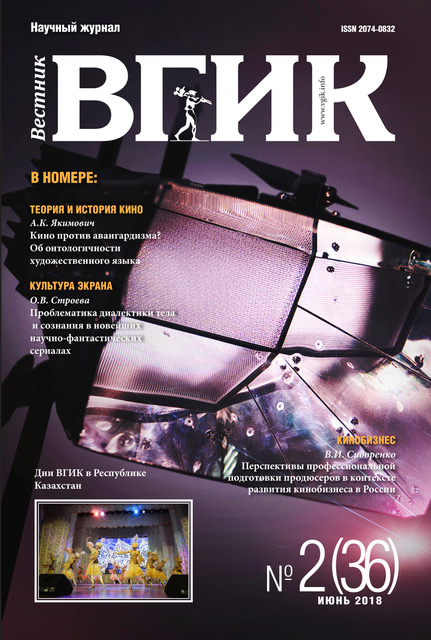Psychological Insight in Asgar Farhadi’s Early Films
- 作者: Grigorieva N.G1
-
隶属关系:
- VGIK
- 期: 卷 10, 编号 2 (2018)
- 页面: 95-106
- 栏目: WORLD CINEMA | ANALYSIS
- URL: https://journals.eco-vector.com/2074-0832/article/view/14586
- DOI: https://doi.org/10.17816/VGIK10295-106
- ID: 14586
如何引用文章
全文:
详细
The article dwells on the work of Asghar Farhadi, one of the leading Iranian film directors, a proud winner of a number of prestigious international awards. The author proves that modern Iranian filmmakers show preferences to other genres as opposed to those favored in the 1990s; metaphorical ellipses have replaced the obvious conclusions and contemplative moralizing has given way to focusing on characters’ inner world. The article emphasizes that A. Farhadi was among the first in Iranian cinema to have fully mastered the achievements of European psychological drama. The logic of characters’ behavior and cause- and-effect relationship appeared to have been the most vulnerable point in the films of Iranian New Wave. The first films by A. Farhadi (“Dancing in the Dust”, 2003; The Beautiful City”, 2004; “Fireworks Wednesday”, 2006) manifested a significant step forward in this respect. Though these pictures are less known to the audience and not so generously acclaimed and rewarded by international film festivals as his famous “Salesman”, they show Farhadi’s skills of a talented psychologist more apparently. The author notes that by turning to psychoanalysis, Farhadi does not reject social aspects, but merely shifts the highlights. His social criticism does not have the acuteness of an open confrontation, but is subtly interwoven into his contemplating narratives, characters’ reflections and motivations. The article also touches the image of women, which has considerably changed since the late 1990s. The director is less interested in social contradictions and tension caused by the oppressed status of women in an Islamic society. Instead, he is more concerned with their inner world and how they deal with complicated issues.
全文:
Abstract: The article dwells on the work of Asghar Farhadi, one of the leading Iranian film directors, a proud winner of a number of prestigious international awards. The author proves that modern Iranian filmmakers show preferences to other genres as opposed to those favored in the 1990s; metaphorical ellipses have replaced the obvious conclusions and contemplative moralizing has given way to focusing on characters’ inner world.
The article emphasizes that A. Farhadi was among the first in Iranian cinema to have fully mastered the achievements of European psychological drama. The logic of characters’ behavior and cause- and effect relationship appeared to have been the most vulnerable point in the films of Iranian New Wave. The first films by A. Farhadi (‘‘Dancing in the Dust”, 2003; The Beautiful City”, 2004; “Fireworks Wednesday”, 2006) manifested a significant step forward in this respect. Though these pictures are less known to the audience and not so generously acclaimed and rewarded by international film festivals as his famous “Salesman”, they show Farhadi’s skills of a talented psychologist more apparently. The author notes that by turning to psychoanalysis, Farhadi does not reject social aspects, but merely shifts the highlights. His social criticism does not have the acuteness of an open confrontation but is subtly interwoven into his contemplating narratives, characters’ reflections and motivations.
The article also touches the image of women, which has considerably changed since the late 1990s. The director is less interested in social contradictions and tension caused by the oppressed status of women in an Islamic society. Instead, he is more concerned with their inner world and how they deal with complicated issues.
作者简介
Natalya Grigorieva
VGIK
编辑信件的主要联系方式.
Email: nloskutova@yandex.ru
PhD (Arts), Associate Professor, VGIK
俄罗斯联邦, Moscow参考
- Гиппенрейтер Ю.Б., Фаликман М.В. Психология мотиваций и эмоций. Хрестоматия. - М.: ACT: Астрель, 2009. - 704 с.
- Гоулман Д. Эмоциональный интеллект. - М.: АСТ: Москва; Владимир: ВКТ, 2009. - 478 с.
- Леонтьев А.Н. Деятельность, сознание, личность. - М.: Смысл; Издательский центр «Академия», 2004. - 352 с.
- Лоскутова Н.Г. Кино Ирана: ведущие тенденции 1950-2000-х годов: дис..кандидата искусствоведения. - М., 2006. - 155 с.
- Папоян К. «Оскар» Асгара Фархади: заслуженная награда или политический шаг? // URL.: http: www.ru.euronews.com (дата обращения: 27.02.2017).
- Цыркун Н. Вилли Ломен в Тегеране // URL:http://kinoart.ru/blogs/villi-lomen-v-tegerane-kommivoyazher-rezhisser-asgar-farkhadi (дата обращения: 06.02.2017).
- Bradshaw P. The Salesman review - Asghar Farhadi's potent, disquieting Oscar-winner // URL: https://www.theguardian.com/film/2017/mar/17/the-salesman-review-asghar-farhadi-oscar-winner-iran (дата обращения: 17.03.2017).
- The New Iranian Cinema. Politics, Representation and Identity. - London-New York, 2002. - 282 p.
- Knarik Papoyan. «Оскар» Асгара Фархади: заслуженная награда или политический шаг? // URL: www.ru.euronews. com (дата обращения: 27.02.2017)
- Azadeh Farahmand. Perspective on Recent (International Acclaim for) Iranian Cinema // The New Iranian Cinema. Politics, Representation and Identity. London-New York: I.B. Taurius Publishers, 2002. P. 93-95
补充文件







